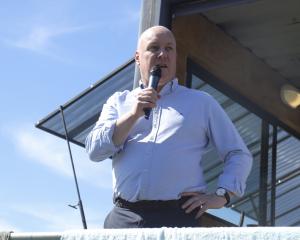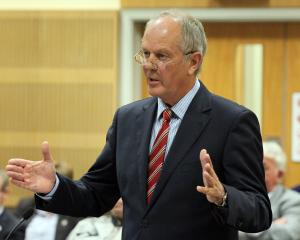
It is not a reportable document, but it is a safe bet that "fly to Dunedin and shaft southerners’ hopes for their new hospital" was not listed for Health Minister Shane Reti or Infrastructure Minister Chris Bishop to be doing on Thursday.
The timing was not coincidental; on Saturday thousands will be taking to the streets protesting what earlier this week were merely projected cuts but which on Thursday became brutal reality.

There is still a meaningless consultation exercise to go through but the end result is assured; the South will not be getting the fully functioning, state-of-the-art, most modern hospital in New Zealand that all parties promised during the election campaign.
It will be called Dunedin Hospital, sited in a city which is as red as red (with bright flourishes of green), but it services the entire lower South; on any given day a-quarter or so of the patients in the current Dunedin Hospital are from the National-held electorates of Invercargill, Southland and Waitaki.
Coming to Dunedin to deliver such a bitter pill did take a certain amount of bravery, and due credit to Dr Reti and Mr Bishop being here in person to face the music ... although they would get much more credit were they in town today to try to explain to an angry crowd in the Octagon why the hospital project is about to be drastically pared back from a business case painstakingly negotiated over several years.
As with almost all things that the government does, the decision came down to money. It is difficult to quantify just how high the cost overruns for the project have reached — several months ago Southern Say was told the true budget had crested $2 billion and it won’t have got any cheaper since then.
The independent report released by the government at the same time as it kicked southerners in the guts was cited as evidence for a potential $3 billion cost for the project; that is a difficult number to back up on available documentation, but given that Southern Say has long predicted that the build would take twice as long and cost twice as much as originally forecast, that huge figure would not come as a surprise.
The government says that is unaffordable. On current budgeting that is probably true: Finance Minister Nicola Willis has a very small allowance for capital expenditure in next year’s Budget and the hospital project could easily swallow that up, and then some.
But you know what? The voters probably wouldn’t mind if the government shook the piggy bank hard and stumped up for yet another increase in the hospital budget.
Voters like hospitals. If they have to pay tax, they are prepared to pay it for a proper healthcare system.
Yes, the government has many other things it needs to pay for too, but everyone and their family has call to use the health system in general, and hospitals in particular.
Successive governments of all stripes have shelved or delayed hospital upgrades around New Zealand for decades for precisely the reason that the previous government and the current one are dealing with now — they are bloody expensive.
Cutting back Dunedin will not make Palmerston North, Nelson, Hawke’s Bay, Tauranga or Whangarei hospitals any cheaper to build; and if you think $3 billion is expensive, just wait until you see what it will cost to revamp a hospital in Auckland when the time comes.
The Rust Report makes it abundantly clear that the new Dunedin hospital project could have been managed much better. That is a lesson dearly learned.
But it still has to be built, and the people of the South are entitled to believe that the promises that they were made about what would be built will be kept.
Bravery in politics
Speaking of courage, some credit is also due to New Zealand First Taieri list MP Mark Paterson for fronting up in Thursday’s urgent debate about the hospital announcement.
He stood to speak knowing full well that his leader Winston Peters had told a meeting in Dunedin Town Hall that New Zealand First would not allow anyone to "nickel and dime" the hospital, and that he was about to make a personally unpleasant and politically unpalatable speech.
But speak he did, unlike other southern government MPs: neither Southland National MP Joseph Mooney nor National Waitaki MP Miles Anderson, who had been in the chamber earlier, took a call.
In the circumstances, Mr Patterson did the only thing he probably could do ... blame Labour.
"Your decision to rescope and delay and hit that inflation surge absolutely is the reason that we are here today, because whilst this project was beset by a litany of errors — it was the wrong site, it was incredibly expensive to buy that site, the demolition costs were incredibly high, it was contaminated, it’s flood prone, it’s on reclaimed land, so it has piling difficulties, and they didn’t even provision for parking."
Naturally, Taieri Labour MP Ingrid Leary wasn’t having a bar of that.
"When they voted last election, many of them were sceptical about the National Party promises, but they desperately wanted access to healthcare. They saw the need for it, and they told me that [National’s hospital promise] had a very big bearing on how they voted.
"Well, those people will be so let down, the ones who put their faith in the National government. "
Somewhat surprisingly, the star of the debate was Nelson’s Labour MP Rachel Boyack, who made a rousing, and prescient, speech.
"As the MP for Nelson, I stand in solidarity with the people of Dunedin, who deserve a decent hospital that is going to serve their region and their community for decades to come", she said.
"What concerns me greatly from the minister’s announcement today is that they are trying to use my community of Nelson as an excuse to not build the facilities that are needed in Dunedin, and yet the minister has already made an announcement about an announcement to downgrade the rebuild of Nelson Hospital."











